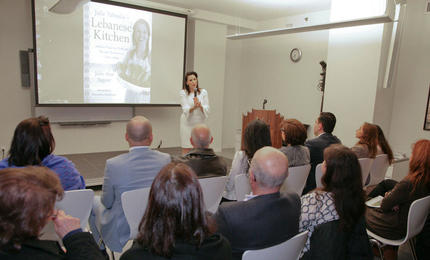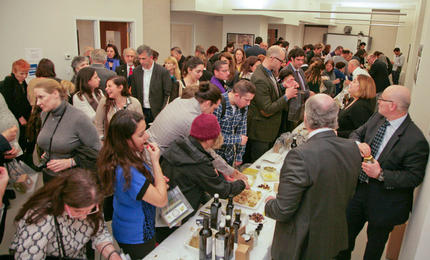LAU NY celebrates Lebanese olive oil
Crowds gather to learn more about the ‘liquid gold’ and get a taste of it at LAU New York Academic Center.
LAU’s New York Academic Center and the Consul General of Lebanon in New York Majdi Ramadan recently hosted a first-of-its-kind evening dedicated to celebrating Lebanese olive oil.
“The olive trees of the town of Bchaale in Lebanon, estimated to be six thousand years old, are the oldest in the world and are known as Noah’s olive trees,” said Consul Ramadan, who referred to the olive tree as a symbol of abundance and peace mentioned in heavenly books and immortalized by poets as a tree of blessing. “Even the first Olympic torch was a flaming olive branch,” Ramadan pointed out to the captivated audience.
Due to Lebanon’s favorable climate and soil conditions, olive production is able to play a central role in the country’s economy. More than twenty percent of the cultivated land is dedicated to growing olive trees and over 110,000 of the 169,000 agriculturalists have olive farms, according to the Lebanese Ministry of Agriculture.
However, Ramadan explained that the sector was facing tremendous obstacles with negative consequences on farmers. Core problems include high production costs, unpredictability of production volumes, aging farms, old trees, small properties, poor storage capabilities, and use of traditional methods in agriculture and pressing. The Ministry of Agriculture, NGOs such as LIVCD and Fair Trade Lebanon, and USAID are all launching initiatives to offset the challenges he went on to explain.
Julie Ann Sageer, a Lebanese-American celebrity chef, author, and public television host – who is known as Julie Taboulie – delved into a full exploration of Lebanon’s olive oil landscape using all five senses. “This [event] is so special because it brings together the olive oil producers, puts the spotlight on products from our country, bridges the gap between Lebanon and America, and transports the olive oil straight here to the U.S.,” said Sageer.
Indeed, 12 oil producers and coops participated in the exhibition and tasting, including Altirs, J. Grove, LELO Fine Foods, Nicholas Phares & Sons, Olea Coop, Olivares, Olive Harvest, Olive Zerta, Terroirs du Liban, Zeit Dayeetna, Zeit Zaman, and Zejd. But before inviting guests to have a taste, representatives of the producers took turns to engage the audience in short, lively, and often-humorous discussions.
LAU graduate Tania Bou Raad who represented Zejd, told the audience that she was very proud and impressed with the efforts made by the university’s New York Academic Center to create a sense of community in the city, “with the goal of sending out positive messages about Lebanon, its people, heritage, know-how, and markets.” Bou Raad views the industry’s greatest challenge as “to be able to market [the product] to the high-end mainstream market in the U.S.,” and not just to the Lebanese diaspora in ethnic markets. “LAU NY is the ideal setting for raising awareness of Lebanese olive oil among the local community,” she said.
“Events like this bring together community members, not only to celebrate the ancient olive trees that have been cultivated since Phoenician times, but also to honor an identity and cultural heritage,” commented LAU NY Academic Center’s Director Lina Beydoun.
“I think it’s just great,” said Elie Nassar, producer of LELO Fine Foods, over a bustling tasting table, “the first Lebanese event for olive oil, a great first step from LAU and [Consul] Majdi [Ramadan]…we are so proud… as you can see, people are so enthusiastic!”
More
Latest Stories
- LAU Engages High Schoolers With Creative Expression and Scholarship Awards
- How Does Digital Media Impact Our Brain?
- Community Development Takes Root at Capstone Presentation Day
- LAU Athletes Return Victorious from Athens and Belgrade
- A New Initiative Toward Harnessing Digital Transformation
- Quality Childcare is the Key to Women’s Empowerment in the Workforce
- A Cardiovascular Conference to Streamline National Expertise
- Aspiring Engineers Compete for Scholarships at LAU



